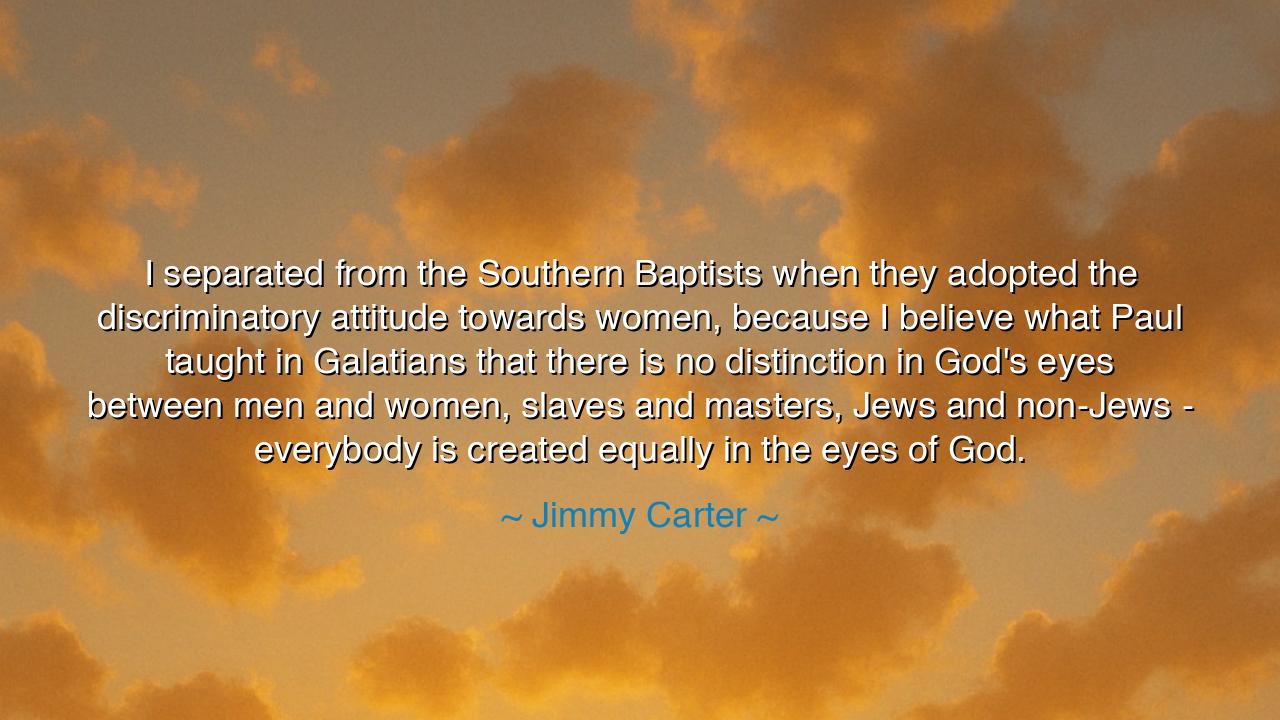
I separated from the Southern Baptists when they adopted the
I separated from the Southern Baptists when they adopted the discriminatory attitude towards women, because I believe what Paul taught in Galatians that there is no distinction in God's eyes between men and women, slaves and masters, Jews and non-Jews - everybody is created equally in the eyes of God.






The gentle hum of the café filled the air, blending with the rhythmic tapping of rain against the window. Jack sat across from Jeeny, his coffee cup cradled in his hands, his gaze drifting toward the rain-soaked streets. Jeeny, sitting opposite him, seemed lost in thought, her fingers lightly tracing the rim of her cup.
Host: After a moment of silence, Jeeny spoke, her voice thoughtful, with a hint of reverence.
Jeeny: “I came across a quote from Jimmy Carter today that really stood out. He said, ‘I separated from the Southern Baptists when they adopted the discriminatory attitude towards women, because I believe what Paul taught in Galatians that there is no distinction in God's eyes between men and women, slaves and masters, Jews and non-Jews - everybody is created equally in the eyes of God.’ What do you think he’s trying to convey here? It seems like he’s challenging some traditional religious views about gender equality.”
Jack: He looked up, his expression thoughtful. “I think Carter is speaking to the core values of equality that are supposed to be at the heart of many religious teachings, including Christianity. When he says that God doesn’t make distinctions between men and women or between different groups of people, he’s asserting the fundamental equality of all human beings. For him, the discriminatory stance of the Southern Baptists toward women contradicted the very principles of equality he believes are central to faith. In essence, he’s saying that any belief system that supports inequality doesn’t align with true Christian teachings.”
Jeeny: “Exactly. Carter’s statement is a powerful rejection of exclusionary beliefs within religion. By referencing Galatians, where Paul teaches that there is no distinction in God’s eyes, Carter is emphasizing that all people, regardless of gender, social status, or ethnicity, are equal in the eyes of God. For him, to embrace discrimination—whether based on gender or any other characteristic—would be to reject a core Christian teaching. It’s a call for authentic faith that upholds equality for everyone.”
Host: The rain outside had softened, leaving a quiet stillness between them. Jack shifted slightly, his fingers still resting on his coffee cup as he continued.
Jack: “I think Carter is also challenging the selective interpretation of scripture. Too often, religious teachings are used to justify practices that divide people, but Carter is pointing out that, at its heart, Christianity is supposed to be about unity and love for all people. By walking away from a group that adopted discriminatory practices, he’s showing that personal conviction and staying true to one’s belief in equality are more important than adhering to tradition or being part of an institution that’s lost its way.”
Jeeny: “Yes, and it’s about personal responsibility too. Carter took a stand when he realized that the institution he was part of wasn’t living up to the principles he believed in. It’s easy to follow tradition or stay within the boundaries of what we’ve always known, but Carter shows us that true faith often requires us to challenge the status quo and stand up for what’s right, even when it’s uncomfortable or goes against the prevailing norms. It’s about being consistent with your values, even when they push you to go against the grain.”
Host: The conversation seemed to deepen, as they both reflected on the courage it takes to stand up for one's beliefs. Jack set his coffee cup down gently, his expression softening.
Jack: “Exactly. Carter’s words remind us that equality and justice are not just ideals we should strive for—they’re foundational values that should be reflected in every aspect of life, including faith. It’s about recognizing that every person, no matter their gender, race, or background, deserves to be treated with respect and dignity. And when an institution deviates from those principles, it’s important to speak out and take a stand, even if it means leaving behind something familiar.”
Jeeny: Her smile was small but filled with understanding. “Yes. Carter’s courage to challenge the discriminatory practices of the Southern Baptists is a reminder that true leadership and faith are about standing up for what’s just, even when it’s difficult. His statement is about aligning religious practice with the fundamental belief in equality for all.”
Host: The rain had stopped, leaving a quiet calm in the café. Inside, Jack and Jeeny sat in the realization that Jimmy Carter’s words are a powerful reminder that equality is at the heart of both faith and justice. His decision to separate from the Southern Baptists shows the courage it takes to uphold one’s beliefs in the face of discrimination, and to align faith with the core values of respect, dignity, and equality for all people. It's a call to action for anyone committed to creating a world where every person is valued equally.






AAdministratorAdministrator
Welcome, honored guests. Please leave a comment, we will respond soon